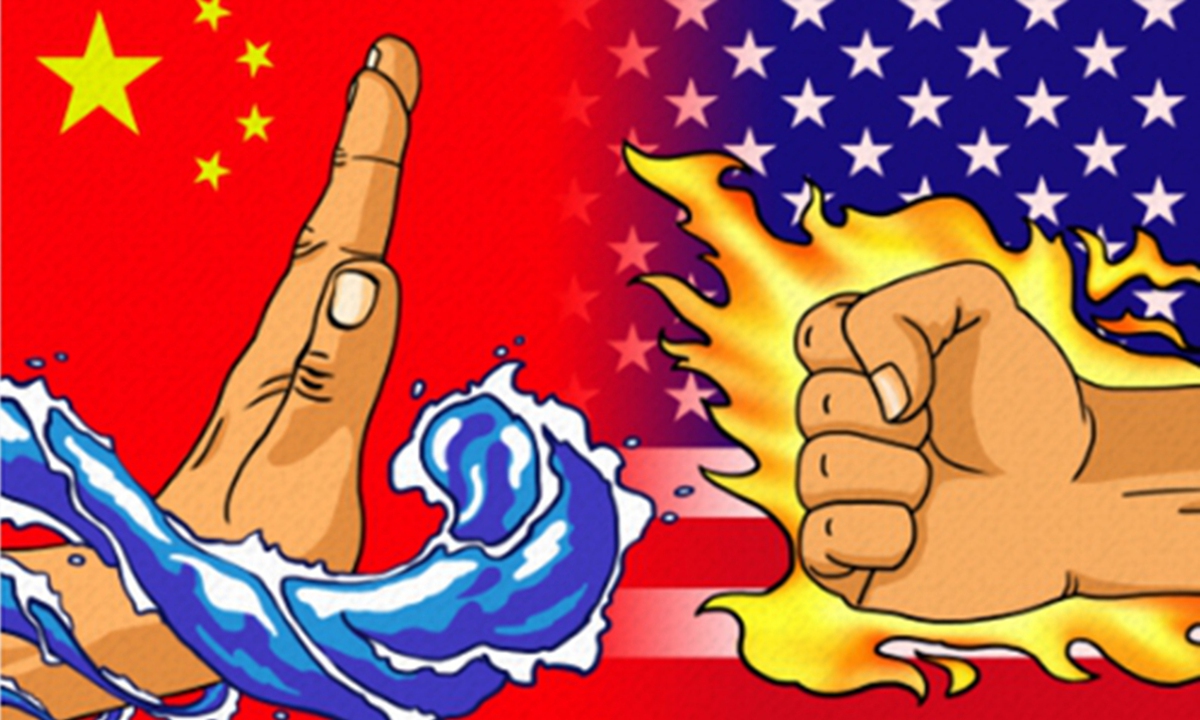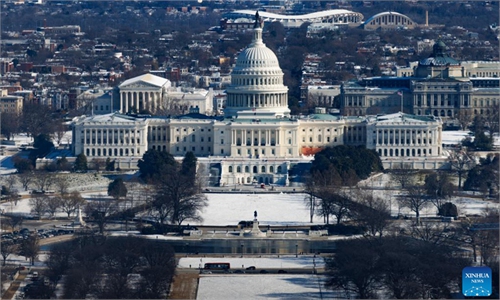
China US Illustration: Liu Rui/GT
US President Joe Biden delivered his last State of the Union address of his tenure on Thursday, and in referring to relations with China, he repeated the old refrain that the US wants "competition with China, not conflict."
The lawmakers who applauded, and people worldwide concerned about US-China relations, knew that he was lying.
On the surface, the significant shifts in the relationship between China and the US may seem like a competition, but fundamentally, it is a contest designed by Washington, which will ultimately result in conflict. It is an irrational, chaotic and unjust contest without any safeguards against conflict, a zero-sum game where only the US is allowed to emerge victorious.
Biden's talk of competition is nothing more than a well-prepared first step of a process toward conflict.
Washington is constantly fueling tensions in Beijing's neighborhood, increasing arms sales to China's Taiwan island, deploying strategic and offensive weapons in the region, as well as sending military personnel to the island permanently, and preparing to send nearly half of its aircraft carrier fleet to the Western Pacific this year. Is this a competition?
President Biden announced on Friday that he would sign a bill forcing Chinese tech giant ByteDance to make a choice: either divest its popular social media platform, TikTok, or face a ban.
This is an act that can be seen as outright looting. If this kind of behavior is also called competition, then it is an insult to the market economy order advocated by the US.
As Huawei and other Chinese communication companies continue to increase their global market share, the US is finding it challenging to compete. But Washington isn't playing by the basic rules of competition. It is resorting to various tactics to restrain Huawei and other countries, citing security concerns as justification.
This approach not only violates the fundamental principles of fair competition but also demonstrates the empire's attempt to monopolize the global market through hegemonic practices. It's no different from the historically plundering Western powers.
In the high-tech field, the US is employing both coercion and incentives to pressure other countries into joining the "decoupling" movement against China, disrupting the global industrial chain to strengthen its hegemonic control.
There are numerous illegal methods to combat competitors, and they will persist in being reinforced.
If this type of "competition" promoted by the US becomes dominant worldwide, what kind of international order can be expected? The US president making "competition" his mantra is a stain on the global order, which will ultimately lead to conflict.
Chinese Foreign Minister Wang Yi recently raised four questions to the US: If the US says one thing and does another, where is its credibility as a major country? If it gets jittery whenever it hears the word "China," where is its confidence as a major country? If it only wants itself to prosper but denies other countries' legitimate development, where is international fairness? If it persistently monopolizes the high end of value chains and keeps China at the low end, where is fairness in competition?
China is willing to compete with the US in a reasonable manner, but this is not the kind of competition that Washington is talking about because that kind of competition will inevitably lead to conflict. If the US insists on engaging in its own competition, China will also be there until the end. Time will tell who has the final say.



